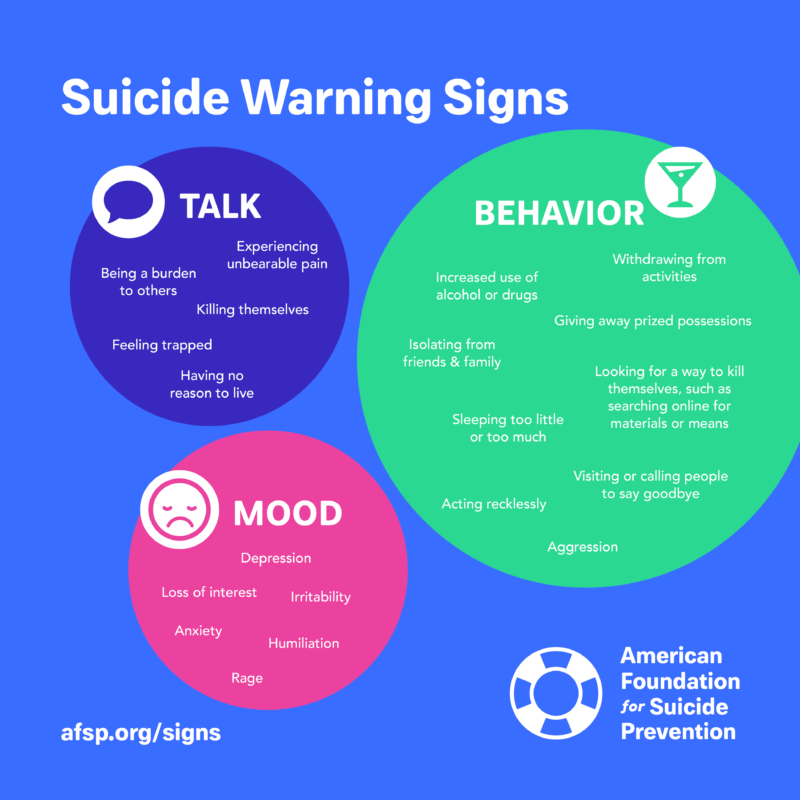Suicide prevention awareness week
TW: Suicide
Suicide Crisis Line: 800/273-8255 or Text TALK to 741741
September 5 – September 11, 2021
I know that talking about suicide is scary. It’s a difficult topic. No one wants to think that someone they care about could be having thoughts of suicide. I sure didn’t want to, even after my daughter said she wished she’d never been born, that she could disappear from the planet. There were times I wanted to bury my head in the sand because it hurt too much to think a spirited and capable young person decided she had nothing to live for. Other times I was desperate for someone to tell me what to do, what words or actions could ease her despair. I had no tools in my tool kit. I hope you never need this resource, but death by suicide statistics are on the rise. I want you to be better prepared than I was.
Information to help if you’re worried about someone:
More often than not, the person experiencing suicidal thoughts and feelings provides hints to their state of mind. Educate yourself as to what these hints can look and sound like. Words like, “Why bother” or “I don’t want to be here” or “I know the solution” or “There’s nothing worth living for” are indications that a person is struggling. Actions can include the person engaging in uncharacteristic behaviors like self-harm or untended personal hygiene or excessive alcohol and drug consumption. They may give away prized possessions. We may be able to sense their desperation, worthlessness, and shame. Being aware of these dynamics in a family member, friend, or co-worker is the first step in providing needed assistance.
Then, talk about it. This is very important: ASKING DIRECTLY ABOUT SUICIDE WILL NOT GIVE SOMEONE THE IDEA. In fact, when asked, most people will admit how they are feeling with relief. Your question may be the ray of light they’ve been waiting for.
Asking is straightforward and specific: Sometimes when people are missing work, worrying about things and withdrawing from friends and family, they are thinking about suicide. Are you thinking about suicide?
(The key is to justify the question with specifics and then ask the difficult question. And in a real conversation, it will come about more naturally than blurting it out like this, but the point remains: Asking can save a life. Silence won’t.)
Reading this you may be thinking, I could never ask someone that. I get it. But we must overcome this discomfort and fear. No one is expecting you to solve the problem. That is work for the professionals, but you can be a caring and compassionate conduit for someone who has been unwilling or unable to seek assistance. Taking the plunge may prevent a lifetime of regret.
After you ask, listen to the answer. Listen attentively and without judgment. Someone in deep emotional pain may be particularly sensitive to body language. Be attentive, calm, and patient. Don’t interrupt or jump into fix-it mode. If you don’t know what to say, you may simply respond with, “There’s so much going on. We need extra help.”
Connect the person to resources available through work, school, or 911. Remember, in areas like Ventura County, when you call 911 you can ask for a CIT trained officer. These officers have specialized training to assist people having a mental health crisis.
Reading a post can’t clue you in to all the ways hints can be missed, dismissed, or avoided. Nor can reading a post provide practice that can help you break the barrier of fear and resistance that prevents people from reaching out. Consider additional education, like this online micro-learning option. If at all possible, don’t go it alone. Seek therapeutic support for yourself if you’re supporting a loved one.
Together, we can make a difference.
Mayim Bialik talks about ending the stigma:
Resources:
American Foundation for Suicide Prevention
Suicide Crisis Line: 800/273-8255 or Text TALK to 741741
National Alliance on Mental Illness
Seize the Awkward
Suicide Prevention Resource Center
National Institute of Mental Health: Suicide Statistics
Take 5 to Save Lives
Warning Signs/Tips to Remember

Tips to remember:
- Know the signs
- Learn what to do
- Don’t be afraid to ask, reach out
- Find help


Thanks for reminding your followers about this topic. It’s a hard one to talk about but so important. I’ve heard people say that considering suicide wasn’t because they wanted to die, it was because they just wanted the pain/depression to stop. I think asking someone if they are considering suicide is a gift. Most people really want to live and thrive, and are willing to grasp onto a lifeline if one is thrown at them.
Thank you, Sue. I so agree. xo